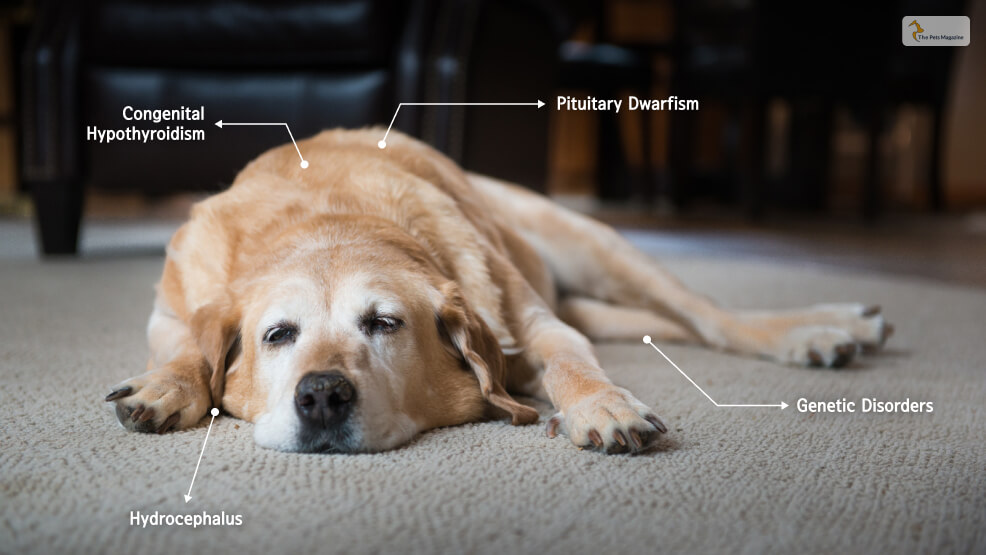Debunking The Myth: Can Dogs Have Down Syndrome?


When you become a dog parent, you will get to hear a lot of misconceptions related to dog health. One such myth is the idea that dogs can have Down syndrome. This belief, while widespread, is rooted in a misunderstanding of both canine genetics and the nature of Down syndrome itself. In this article, we will delve into the scientific facts, explore the origins of this myth “can dogs have down syndrome”, and clarify why dogs cannot have Down syndrome.
What Is Down Syndrome?

Before exploring can dogs have Down syndrome or whether it is just a myth, let us learn what it is. In simpler words, Down syndrome is a genetic condition that occurs when a person has an extra copy of chromosome 21, either fully or partially. This extra genetic material affects the development of the body and brain, leading to a range of physical and intellectual disabilities.
What are the Signs Of Down Syndrome?

The presence of an extra genetic material can have several effects. People with Down syndrome often have distinct physical features such as a flattened face, small head, short neck, and upward-slanting eyes.
They may also experience developmental delays and intellectual disabilities, which can vary from mild to moderate. Additionally, individuals with Down syndrome are at a higher risk for certain health issues, including heart defects, gastrointestinal problems, and thyroid conditions.
The US Disease Control and Prevention (CDC) has said that there could be some common physical features of Down syndrome, such as a line across the palm of the hand called a palmar crease and poor muscle tone.
The Global Down Syndrome Society has pointed out that some of these features may be recurrent but isn’t universal. They say, “although children and adults with Down syndrome may share some common features, they look more like their immediate family members than like each other.”
Can Dogs Have Down Syndrome?

The short and simple answer to this question is no; dogs dont have Down syndrome. This is just a misconception. So why can’t dogs have dog syndrome?
This is because there are quite a few similarities between man and dog, but there are certain key differences. You already know that Down syndrome is a specific genetic condition that occurs in humans due to an extra copy of chromosome 21.
Well, dogs have a different number of chromosomes (78 in total), and their genetic makeup doesn’t allow for the same type of chromosomal abnormalities that cause Down syndrome in humans.
However, dogs can have other genetic disorders or health issues that might cause symptoms similar to those seen in Down syndrome, such as developmental delays or physical abnormalities. These conditions are different and are not the same as Down syndrome.
Conditions Similar To Down Syndrome

Now that you know dogs don’t have Down syndrome, you may ask, are there any conditions similar to Down syndrome that dogs are at risk of? Dogs are diagnosed with many congenital and developmental conditions that have symptoms that are similar to Down syndrome in humans.
While dogs cannot have Down syndrome, they can exhibit symptoms that might resemble those seen in humans with Down syndrome due to other genetic or health conditions. Here are some conditions and symptoms in dogs that might appear similar:
- Congenital Hypothyroidism: This condition occurs when a dog’s thyroid gland is either underdeveloped or not functioning properly from birth. The thyroid gland is crucial for regulating metabolism, growth, and development. It can cause growth delays, mental dullness, and abnormal facial features.
- Pituitary Dwarfism: This condition is caused by a deficiency of growth hormone due to an underdeveloped or malfunctioning pituitary gland. It is most commonly seen in certain breeds, such as German Shepherds, Weimaraners, and Spitz. Dogs with this condition may have stunted growth, a broad head, and developmental delays.
- Hydrocephalus: This is a condition where fluid accumulates in the brain, leading to increased pressure on the brain. This can cause a range of neurological symptoms and, if left untreated, can result in permanent brain damage or even death. Some of the common symptoms are domed skull, wide-set eyes, seizures, head pressing, and blindness.
- Genetic Disorders: Various genetic abnormalities caused by abnormalities in their DNA can result in physical and developmental symptoms. These symptoms might be mistaken for Down syndrome. Some common genetic disorders in dogs include hip and elbow dysplasia, epilepsy, hypothyroidism and Von Willebrand’s disease.
If you notice any unusual symptoms in your dog, it’s important to consult with a veterinarian. They can diagnose properly and recommend the best course of action to ensure your pet’s health and well-being.
Debunking the Myth
So now you know the answer to the question ‘can dogs have down syndrome?’ is No. Moreover, it is also a misconception. However, our canine companions can suffer from other genetic disorders and health issues that may present similar symptoms. By debunking this myth, we can better focus on the real health needs of our pets and ensure they receive the proper care and attention they deserve.
Frequently Asked Questions
Dogs cannot have Down syndrome, technically speaking. Their number of chromosomes differs from that of humans. But other conditions can mimic the symptoms of Down Syndrome.
Dogs do not get Down syndrome but can have other conditions that mimic the signs. Their life expectancy, therefore, differs based on their diagnosis.
Dogs do not have Down syndrome, but if your dog shows signs of abnormality, get in touch with your veterinarian. A medical provider can help you accurately deal with the issue at hand.
Have you read these?









Leave A Comment